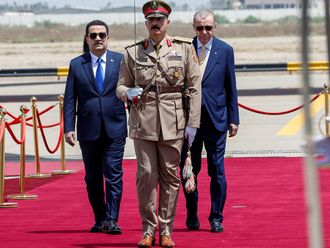Washington: Despite hopes that the US military 'surge' in Iraq would encourage economic and political headway and sap the strength of the insurgency, little lasting progress has been achieved, according to a new US report.
The study, based on the assessments of dozens of US military and civilian officials working at local levels across Iraq, runs counter to the forecasts by the top US commander in Iraq, Gen David Petraeus and Ambassador Ryan Crocker. It said that with the exception of Al Anbar province, there has been 'little progress' toward political reconciliation, a key US goal in Iraq.
Withdrawal of US troops would produce "open battlegrounds of ethnic cleansing" in some Baghdad neighbourhoods and elsewhere in Iraq, the report said.
In congressional hearings in September, Petraeus and Crocker testified that the addition of 28,000 American troops in Iraq, ordered last winter by President Bush, was tamping down violence and providing opportunity for economic projects, government reform and political reconciliation. The troop 'surge' is temporary, however, with the first of the reinforcement units scheduled to leave Iraq before Christmas.
But instead of charting progress, the new report, by the Special Inspector General for Iraq Reconstruction, warns that Iraq "will require years of steady engagement" before there is significant progress in providing Iraqis with power and clean water, jobs, health resources and government that works.
"Iraq's complex and overlapping sectarian, political, and ethnic conflicts, as well as the difficult security situation, continue to hinder progress in promoting economic development, rule of law, and political reconciliation," the report cautioned.
With a $44 billion (Dh161.5billion) investment by American taxpayers in rebuilding Iraq, there are some visible improvements, the report said. But it warned that local and provincial governments "have little ability to manage and maintain" new health clinics, water treatment plants, power-generating facilities and other projects.
One US official in Iraq, quoted anonymously in the report, said he foresaw a "train wreck" ahead as costly US projects in Iraq grind to a halt for lack of manpower or maintenance.
The report's conclusions parallel previous US assessments, including a major national intelligence estimate in August that said there had been little economic improvement. That report forecast that continuing sectarian violence would continue displacing Iraqis from their own neighbourhoods and that Iraq's government would "become more precarious" over the next six to 12 months.
Nevertheless, Defence Secretary Robert M. Gates dismissed the report's conclusion, which he said "doesn't square" with what he is hearing from senior US military officers in Iraq.
The office of the Special Inspector General for Iraq Reconstruction, created by Congress three years ago to probe US spending in Iraq, is headed by Stuart W. Bowen, a lawyer who previously worked for then-Gov George W. Bush in Texas and served on Bush's White House staff in Washington.
His report, released on Thursday, is based on assessments from 32 provincial reconstruction teams made up of US military and civilian experts in local government.











